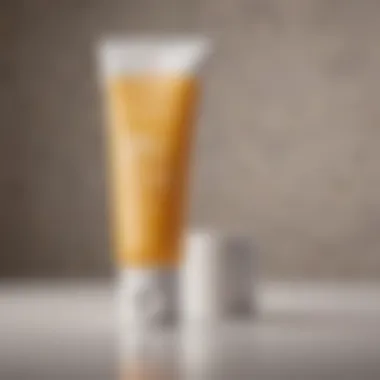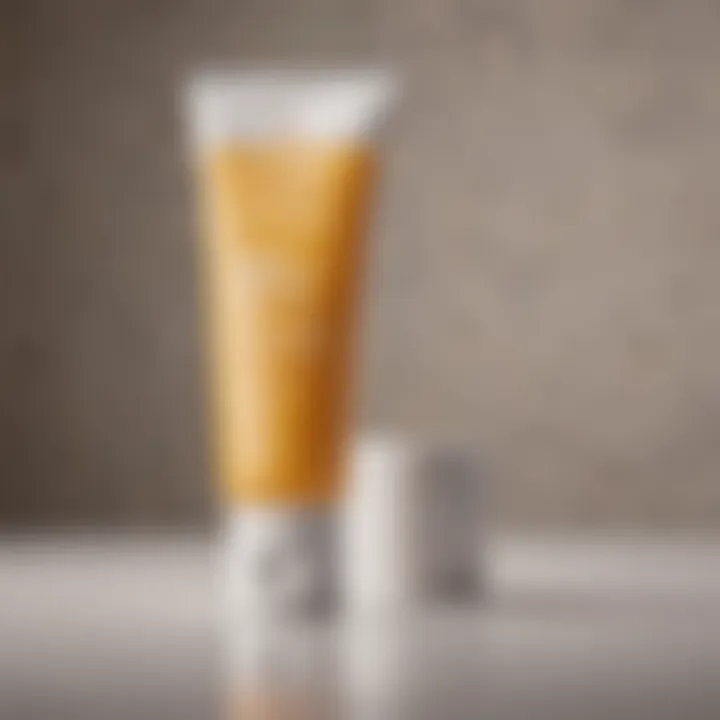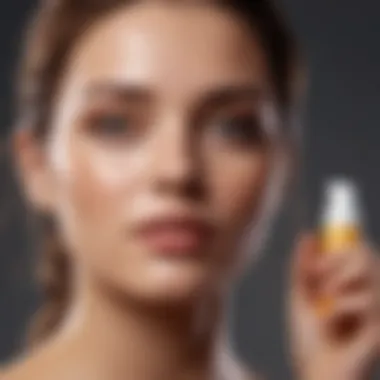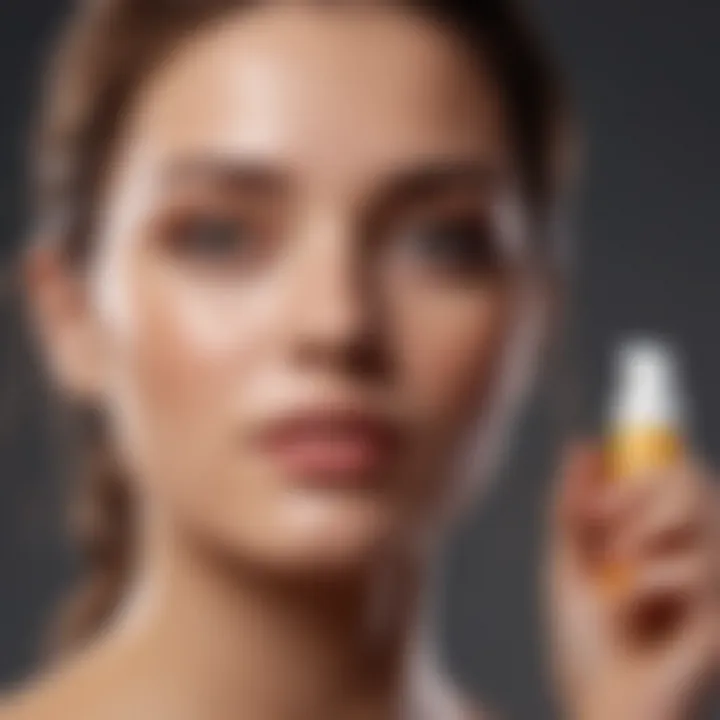Top Sunscreens That Help Prevent Acne Breakouts


Intro
In the quest for clear skin, the role of sunscreen often goes unnoticed. Many women associate sunscreen solely with sun protection, overlooking its potential benefits for acne-prone skin. This article focuses on how selecting the right sunscreen can contribute significantly to acne prevention and overall skin health. With the market flooded with various products, it’s essential to demystify the claims and identify what truly works.
The Importance of Sunscreen for Acne-Prone Skin
Using sunscreen is crucial for all skin types, but particularly for those susceptible to acne. Sunscreen helps shield the skin from harmful UV rays that not only cause premature aging but can also exacerbate acne. Moreover, some treatments for acne make the skin more sensitive to sunlight, increasing the risk of sunburn. Thus, incorporating a suitable sunscreen into your skincare routine can nurture your skin while preventing further complications.
Debunking Common Myths
There are various misconceptions surrounding sunscreen and acne, which may deter individuals from using it:
- Sunscreen causes breakouts: Many believe that topical sunscreens clog pores. This may be true for some formulations but selecting non-comedogenic products can avoid this issue.
- You only need sunscreen on sunny days: UV rays penetrate through clouds and can affect the skin even indoors. Daily application is necessary to maintain protection.
"Daily sunscreen use is essential, regardless of the weather."
Understanding these myths can encourage more people to adopt sunscreen as an integral element of their skincare regimen.
Key Ingredients to Look For
Identifying the right sunscreen involves scrutinizing its ingredients. Here are some beneficial components for those prone to acne:
- Zinc Oxide: Known for its calming properties, zinc oxide can help soothe irritated skin and provide broad-spectrum protection.
- Titanium Dioxide: Another physical blocker, titanium dioxide protects without irritating the skin.
- Salicylic Acid: While commonly found in acne treatments, it’s sometimes included in sunscreens for its exfoliating properties, aiding in unclogging pores.
Choosing sunscreens with these ingredients ensures protection while helping prevent future breakouts.
Recommendations for Women’s Sunscreen
When selecting a sunscreen, consider these tailored recommendations:
- Opt for Gel Formulas: These tend to be lighter in texture and less likely to cause breakouts.
- Check for Non-Comedogenic Labels: This indicates that the product won’t clog pores.
- Consider Broad-Spectrum Protection: This ensures effective guarding against both UVA and UVB rays.
Some recommended products that fit these criteria include:
- La Roche-Posay Anthelios Melt-in Milk Sunscreen
- Neutrogena Hydro Boost Gel Lotion Sunscreen
Utilizing products from reputable brands can enhance your skincare routine significantly.
Closure
Choosing the right sunscreen does not have to be complicated. By understanding the importance of daily application, debunking myths, and knowing which ingredients to seek, women can pave the way for healthier, clearer skin. Ultimately, informed decisions lead to an enhanced skincare experience that not only protects but also nurtures.
Understanding the Need for Sunscreen
Sunscreen acts as a crucial barrier between your skin and the sun's harmful ultraviolet (UV) rays. The importance of understanding why and how to use sunscreen cannot be overstated, especially for those with acne-prone skin. Using sunscreen effectively supports skin health and prevents potential breakouts by protecting the skin from damage that could worsen existing conditions.
The Importance of Sun Protection
Sun protection is vital for everyone. It prevents sunburns, premature aging, and skin cancer. For individuals with acne-prone skin, the importance expands further. UV exposure can lead to inflammation and pigmentation, exacerbating acne scars and delaying healing. Integrating sunscreen gently into a daily skincare routine guards not just against harmful rays but also promotes overall skin wellness.
Impact of UV Rays on Skin Health
UV rays exist in two primary forms: UVA and UVB. UVA rays penetrate deeply, causing long-term skin damage and increasing the risk of cancer. In contrast, UVB rays are responsible for sunburn. Both types contribute to various skin issues, including the aggravation of acne and formation of dark spots. Long-term exposure can lead to serious conditions like melanoma. Protecting skin through adequate sunscreen use serves as a proactive measure against these risks.
Sunscreen Myths and Facts
Many myths surround sunscreen that can lead to misinformation. A common misconception is that individuals with darker skin do not need sunscreen due to melanin acting as a natural protector. This notion is flawed; everyone can benefit from using sunscreen. There is also a belief that oily sunscreens worsen acne. However, using non-comedogenic, lightweight formulations can actually prevent breakouts while providing protection.
"Investing in a good sunscreen is not just about looking good; it is about keeping your skin healthy in the long run."
In summary, acknowledging the significance of sunscreen in your daily routine is foundational for preventing acne and maintaining healthy skin. Educating oneself on the facts versus myths surrounding sunscreen will empower informed decisions.
Acne and Sunscreen Interconnection
Understanding the relationship between acne and sunscreen is crucial for anyone concerned about skin health. Many individuals with acne-prone skin often avoid sunscreen due to fears that it will exacerbate their breakouts. However, preventing sun damage is vital to maintaining overall skin health. This section explores how sunscreen can interact with acne, the importance of selecting the right formulations, and how specific ingredients can either help or hinder skin clarity.


How Sunscreen Can Cause Acne
Sunscreens can potentially contribute to acne, especially if they contain heavy oils or certain chemical ingredients. Some formulations may clog pores, leading to increased breakouts. Ingredients like octocrylene or oxybenzone, while effective for sun protection, can trigger reactions in sensitive skin. Awareness and mindfulness regarding formulations are crucial for acne-prone individuals. It is important to conduct patch tests when trying new products.
Choosing Non-Comedogenic Formulations
When selecting sunscreen, choosing non-comedogenic products is essential for those with acne-prone skin. Non-comedogenic formulations are designed to not block pores. This means that they can provide necessary sun protection without aggravating acne conditions. Look for labels that specifically mention non-comedogenic or oil-free. Furthermore, physical sunscreens containing zinc oxide or titanium dioxide are often recommended; they are less likely to irritate skin compared to some chemical options.
Effect of Ingredients on Acne-Prone Skin
The ingredients in sunscreen can significantly impact acne-prone skin. Minerals like zinc oxide have anti-inflammatory properties which can help reduce redness and irritation. On the contrary, some chemical filters can lead to skin issues for sensitive individuals. Ingredients that hydrate the skin, such as glycerin or hyaluronic acid, can be beneficial in preventing dryness, promoting a balanced complexion. Thus, examining ingredient lists on sunscreen products is essential for anyone seeking to prevent acne.
Key Ingredients in Sunscreens
Understanding the key ingredients in sunscreens is crucial for anyone concerned about both sun protection and acne prevention. The right formulation can significantly influence skin health, especially for those susceptible to breakouts. This section will delve into essential components found in sunscreens that either aid in maintaining clear skin or potentially contribute to breakouts. Knowing these ingredients empowers readers, particularly women of all ages, to make informed choices in their skincare routines.
Zinc Oxide and Titanium Dioxide
Zinc oxide and titanium dioxide are common mineral filters used in sunscreens. They operate by providing a physical barrier against UV rays. These ingredients reflect UV radiation instead of absorbing it, which can be gentler on the skin. Notably, zinc oxide is praised for its anti-inflammatory properties, which can be beneficial for acne-prone skin. It helps reduce redness and irritation that often accompany breakouts.
On the other hand, titanium dioxide offers similar protective qualities but is known to be slightly less irritating to sensitive skin. Both of these ingredients are non-comedogenic, meaning they do not clog pores, which is a vital factor when considering sunscreens for acne-prone skin. When choosing a sunscreen, look for formulations containing either of these two ingredients to ensure sun protection while minimizing the risk of acne.
Chemical Filters: Safety and Efficacy
Chemical sunscreens contain organic compounds that absorb UV radiation and convert it into heat, which the skin then releases. While popular for their lightweight and non-greasy feel, their safety for acne-prone skin can be debated. Common chemical filters include avobenzone, octisalate, and octocrylene. These ingredients can be effective in protecting against UV damage, but they might irritate some sensitive skin types.
Before opting for a chemical sunscreen, it is wise to check for any specific allergies or sensitivities to these ingredients. Users should pay attention to how their skin reacts after application. For those with oily or acne-prone skin, seeking chemical formulas that are labeled as “oil-free” or “non-comedogenic” can help reduce the chances of breakouts while still offering adequate sun protection.
Beneficial Additives for Skin Health
In addition to UV filters, many sunscreen products include beneficial additives that enhance skin health. Ingredients like hyaluronic acid and niacinamide are becoming more common in sunscreens.
Hyaluronic acid helps retain moisture, which is vital for maintaining skin hydration without clogging pores. This component is especially beneficial when considering that some sunscreens can lead to dryness, exacerbating acne conditions.
Meanwhile, niacinamide is known for its anti-inflammatory properties and ability to regulate oil production. It helps strengthen the skin barrier, reducing the likelihood of breakouts and irritation. Choosing sunscreens with these additives can help provide extra care for skin that is prone to acne, making them an essential consideration in your selection process.
Key takeaway: Formulating a skin care strategy that incorporates effective sunscreens is a fundamental step in preventing acne while protecting against sun damage. Always check ingredient labels carefully to choose products that suit your skin type.
Formulations Suitable for Acne-Prone Skin
Selecting the correct formulation of sunscreen is vital for individuals with acne-prone skin. Given that these skin types are often sensitive and reactive, the choice of sunscreen can significantly impact skin health and acne management. The skin barrier needs protection from UV rays, while simultaneously avoiding products that may exacerbate breakouts. This section will dive into different types of sunscreen formulations and how they can be suitable for acne-prone skin.
Gel-Based Sunscreens
Gel-based sunscreens tend to be lightweight and non-greasy. They offer a refreshing feel, which is often preferred by individuals with oily or acne-prone skin. The texture of these sunscreens allows for rapid absorption, minimizing the chances of clogging pores. Many gel formulations contain soothing ingredients like aloe vera or hyaluronic acid, which can help in calming inflamed skin. When choosing a gel-based sunscreen, look for labels that specify non-comedogenic to ensure they will not worsen your acne. In addition, seek out products that also provide hydration without excess oil. This dual action can be beneficial in maintaining skin moisture while preventing sun damage.
Lightweight Lotion Formulas
Lightweight lotion sunscreens offer a balance between protection and hydration. These formulas generally have a thinner consistency than traditional creams, making them more suitable for those with oily or combination skin. With ingredients designed to absorb excess oil, lightweight lotions often provide adequate sun protection without leaving a heavy residue. Some may even include additional beneficial components such as antioxidants, which promote overall skin health. When selecting a lightweight lotion, prioritize mattifying options, which minimize shine throughout the day. It is essential to ensure that it is effective against both UVA and UVB rays for comprehensive skin defense.
Mineral vs. Chemical Sunscreens
The ongoing debate between mineral and chemical sunscreens is significant for those with acne-prone skin. Mineral sunscreens, which often contain zinc oxide or titanium dioxide, work by sitting on top of the skin and reflecting UV rays. They tend to be gentler and are less likely to irritate sensitive skin, making them a popular choice among people prone to breakouts.
On the other hand, chemical sunscreens absorb UV rays and can contain a variety of active ingredients. For some, these formulations may be heavier and more likely to trigger acne. However, there are lightweight chemical options available that can be suitable if they are non-comedogenic and fragrance-free.
Ultimately, individuals with acne-prone skin may find that mineral sunscreens are generally safer to use. Each body responds differently, so testing a few formulations may be necessary to determine which suits your skin best.
Key takeaways: Choose gel-based or lightweight lotion formulas, prioritize non-comedogenic labels, and consider mineral sunscreens for less irritation.
Understanding these formulations will help in making informed decisions to enhance your skincare routine. By focusing on appropriate sunscreen options, individuals can better manage acne while ensuring comprehensive sun protection.
How to Apply Sunscreen in Skincare Routine
Applying sunscreen correctly is crucial for both acne prevention and overall skin health. Many people overlook this step or do it improperly, leading to ineffective protection and potential skin issues. Understanding how to incorporate sunscreen into your daily routine can significantly influence your skin's condition, especially for those prone to acne.
The Right Amount to Use


Using the right amount of sunscreen is essential. You should apply about two milligrams of sunscreen per square centimeter of skin, which translates to roughly one ounce (a shot glass full) for the entire body. For the face alone, a nickel-sized amount is a good guideline. Applying too little can leave your skin unprotected against harmful UV rays, making it susceptible to damage and, potentially, triggering breakouts.
Consider these points when determining how much sunscreen to use:
- Consistency: Use a consistent amount each time you apply. This helps ensure your skin receives adequate protection.
- Coverage: Pay attention to areas often missed, like the ears and neck. They also need protection.
Timing of Application
Timing your sunscreen application plays a significant role in its effectiveness. Ideally, sunscreen should be applied as the last step in your skincare routine, right before makeup if you wear any. Experts recommend applying it approximately 15 to 30 minutes before sun exposure. This allows the product to absorb and form a protective barrier on the skin.
Here are some timing tips:
- Daily Routine: Make sunscreen application a non-negotiable part of your morning skincare routine,
- Reapplication: If you're outdoors for extended periods, reapply every two hours, or immediately after swimming or sweating.
Layering with Other Products
Layering is a common practice in skincare, but it must be done correctly when adding sunscreen. Start with lightweight, hydrating products and follow with sunscreen. If you use serums or moisturizers, ensure they are absorbed before applying your sunscreen. This layering helps maintain effectiveness without compromising the benefits of each layer.
When layering, consider:
- Order of Application: General guideline is to start with thinner products and move to thicker ones, applying sunscreen last.
- Compatibility: Ensure your sunscreen is compatible with other skincare products. Some ingredients can render SPF ineffective.
Applying sunscreen properly is as important as using it at all. Incorrect application can lead to sun damage and breakouts.
In summary, applying sunscreen correctly is vital in a skincare routine, particularly for those who are prone to acne. Paying attention to the amount used, the timing of application, and how you layer your products can help protect your skin while enhancing its health.
Top Sunscreen Recommendations for Acne-Prone Skin
Selecting the right sunscreen is crucial in preventing acne while also protecting the skin from harmful UV rays. For acne-prone individuals, some sunscreens can exacerbate skin issues if they are not carefully chosen. Thus, understanding the specific elements and benefits of sunscreens is vital. Each choice should consider the formulation, texture, and ingredient composition.
Dermatologist-Recommended Products
Consulting with dermatologists is often pivotal in making informed decisions about sunscreen. Leading experts in skincare recommend products that are specifically designed for those with acne tendencies.
- EltaMD UV Clear Broad-Spectrum SPF 46: Formulated with niacinamide and hyaluronic acid, it is known for its lightweight feel and helps calm the skin.
- CeraVe Hydrating Mineral Sunscreen SPF 30: Contains essential ceramides, not only providing physical sun protection but also hydrating the skin.
- La Roche-Posay Anthelios Clear Skin Oil-Free Sunscreen SPF 60: This formulation is non-comedogenic and absorbs excess oil, making it suitable for oily, acne-prone skin.
"Choosing dermatologist-recommended products can significantly reduce the risk of breakouts while enhancing skin protection."
Affordable Options
Not everyone needs to spend a fortune on effective sunscreens. Many affordable options provide quality protection while being suitable for acne-prone skin.
- Neutrogena Ultra Sheer Dry-Touch Sunscreen SPF 100: A lightweight, non-greasy formula that can withstand sweat and water, suitable for active lifestyles.
- Biore UV Aqua Rich Watery Essence SPF 50+: Known for its refreshing texture, this sunscreen easily blends into the skin without a heavy residue, making it great for everyday wear.
- Aveeno Positively Mineral Sensitive Skin Sunscreen SPF 50: Offers broad-spectrum protection while being gentle on the skin, making it an excellent choice for those with sensitivities.
Luxury Selections for Premium Protection
For those willing to invest in high-end products, several luxury sunscreens offer advanced technologies and formulations for better skin health.
- SK-II AURA Essence SPF 50: This sunscreen not only provides sun protection but also includes skincare benefits that promote a youthful glow.
- Shiseido Ultimate Sun Protector SPF 50+: Renowned for its unique technology that reinforces protection, this sunscreen is lightweight and designed to stay effective even in humid conditions.
- Dr. Barbara Sturm Sun Drops SPF 50: An innovative formula that combines sun protection with skincare, containing ingredients that hydrate and protect the skin barrier.
Selecting the correct sunscreen can help maintain overall skin health while preventing acne. Recognizing the difference in formulations and engaging with trusted products lays the foundation for effective sun protection.
Common Mistakes to Avoid
Sunscreen is vital for skin health, particularly for individuals prone to acne. However, using it incorrectly can negate its benefits. Identifying common mistakes can help ensure effective prevention of breakouts while maintaining skin integrity. This section will explore three prevalent errors: ignoring expiration dates, inadequate reapplication, and over-reliance on makeup with SPF.
Ignoring Expiration Dates
One significant mistake is using expired sunscreen. Sunscreen has a shelf life, typically ranging from two to three years. After this period, the effectiveness of active ingredients diminishes. Applying expired products can leave skin vulnerable to harmful UV rays, which may exacerbate acne. To avoid this error, check the expiration date on the sunscreen bottle before use. Regularly discard old products. By ensuring that your sunscreen is within its shelf life, you can enhance your skin protection and acne prevention strategy.
Inadequate Reapplication
Another common error is not reapplying sunscreen frequently enough. Many people apply sunscreen once in the morning and then forget about it. However, for adequate protection, sunscreen should be reapplied every two hours, especially after swimming or sweating. Failure to do so can lead to sunburn and increased oil production, which may worsen acne. To maintain effective protection, carry sunscreen with you for regular touch-ups throughout the day. Set reminders on your phone or use a compact format for easy application on the go. Consistency in reapplication is key to prevent damage that can trigger breakouts.
Over-reliance on Makeup with SPF
Many believe makeup products with SPF offer sufficient skin protection. However, relying solely on these products is a mistake. The amount of makeup needed for effective UV protection is often more than most people apply. Thus, using makeup with SPF should supplement, not replace, your regular sunscreen. To ensure adequate sun protection, apply a generous layer of a dedicated sunscreen first, followed by your makeup. This layering strategy ensures that your skin receives the full benefits of both products.


"Protecting your skin from UV rays should not be compromised. Avoiding these common mistakes can greatly enhance your skincare routine."
By recognizing these pitfalls, you can improve the effectiveness of your sunscreen usage, ultimately minimizing the chances of acne flare-ups and promoting overall skin health.
Lifestyle Factors Affecting Acne and Skin Health
Understanding lifestyle factors is crucial in the context of acne and skin health. Many women find themselves battling breakouts, and often, they look to products for solutions. However, external products alone do not address the root causes of skin issues. Factors like diet, stress, and hydration play significant roles in skin condition and overall health. Adjusting these lifestyle elements can lead to any improvements and a more effective skincare routine.
Dietary Influences on Skin Condition
Diet significantly affects the condition of the skin. Foods rich in antioxidants, vitamins, and minerals can promote healthy skin. Conversely, high-glycemic foods, like white bread and sugary snacks, can trigger spikes in insulin levels, which may lead to increased oil production and acne. Consuming plenty of fruits, vegetables, whole grains, and lean proteins can support skin health.
- Vitamin A is essential for skin repair. Include carrots, sweet potatoes, and spinach in your meals for adequate intake.
- Omega-3 fatty acids, found in fish like salmon and nuts, help reduce inflammation that contributes to acne.
- Zinc-rich foods, such as pumpkin seeds and chickpeas, can also support skin healing and reduce outbreaks.
By choosing a balanced diet with these nutrients, individuals can positively influence their skin condition. Personalized adjustments to dietary habits can lead to less acne and healthier skin overall.
Stress Management and Its Role
Stress can dramatically affect skin health. The adrenal glands produce more cortisol during stressful times. This hormone increases oil production in skin glands, which can lead to breakouts. Managing stress is therefore vital for maintaining clear skin.
- Practicing mindfulness or meditation can help regulate stress levels.
- Regular exercise can not only relieve stress but also improve blood circulation, delivering essential nutrients to the skin.
- Engaging in hobbies, ensuring sufficient sleep, and discussing concerns with supportive people can also reduce stress.
Adopting a stress management routine contributes to a healthier lifestyle and encourages better skincare results. Less stress can mean clearer skin; this is an essential aspect of acne prevention.
Importance of Hydration
Hydration cannot be overlooked. Drinking enough water is fundamental for maintaining skin moisture. When skin is well-hydrated, it is better able to absorb any products applied. Proper hydration helps in regulating oil production, preventing dryness, and ensuring skin remains supple and healthy.
- Aim to drink at least eight glasses of water daily, though more may be necessary with higher activity levels or in hot climates.
- Consuming fruits and vegetables with high water content, such as cucumbers, oranges, and strawberries, can further enhance hydration.
- Herbal teas and other low-caffeine beverages can also contribute to fluid intake.
Not only does hydration support skin elasticity, but it also promotes an overall better complexion. Keeping the body well-hydrated can significantly influence skin health and aid in acne prevention.
The Role of Professional Skincare
In the realm of acne prevention, the influence of professional skincare cannot be overstated. Expert guidance from skincare professionals, particularly dermatologists, can significantly change how one approaches acne management and sun protection. These experts possess specialized knowledge that sets them apart in recognizing and treating skin conditions effectively. With their help, individuals can navigate the complexities of sunscreen choices that align with their unique skin concerns.
Consulting with a Dermatologist
Consulting with a dermatologist is a pivotal step for anyone struggling with acne. These professionals evaluate skin types, identify specific concerns, and recommend tailored solutions. During consultations, patients receive in-depth assessments, including skin history and behavioral patterns. Dermatologists often have access to the latest research and products effective for acne-prone skin. They can also debunk prevalent myths regarding sunscreen and acne, replacing misinformation with factual guidance. For example, many believe that all sunscreens clog pores; however, dermatologists can recommend non-comedogenic options that protect without causing breakouts.
In-office Treatments and Their Benefits
For those seeking immediate results, in-office treatments can offer effective solutions. Dermatologists may suggest chemical peels, laser therapy, or microdermabrasion, targeting acne and skin tone irregularities. These procedures can enhance the results of topical sunscreen applications and overall skincare routines. The benefits are noteworthy; they not only improve skin texture but also prime the skin for better sunscreen absorption. Regular sessions can lead to long-lasting results, supporting the skin's health and appearance over time. Moreover, dermatologists can monitor progress, adjusting treatments as required.
Establishing a Personalized Skincare Routine
Creating a personalized skincare routine is essential for optimal acne prevention. A dermatologist can aid in developing a regimen that harmonizes with individual needs. This routine often includes selecting appropriate cleansers, treatments, and, importantly, sunscreens that cater to specific skin types. The synergy between these elements promotes healthier skin. A structured routine helps ensure consistent product use, which is crucial for reaping the benefits long-term. Regular follow-ups with a dermatologist help fine-tune this routine, adapting it as the skin’s condition evolves.
"The role of professional skincare is invaluable; expert advice can lead to transformative changes in skin health and acne management."
Engaging with professionals creates a strong foundation for effective skincare. Their oversight empowers individuals to embrace the proactive approach necessary for maintaining healthy, radiant skin.
Summarizing Key Takeaways
Understanding the nuances of sunscreen choice is vital, especially for individuals prone to acne. This section distills the key components discussed in the article, emphasizing the importance of using the right sunscreen to prevent breakouts and support overall skin health.
The foundational element is the selection of a non-comedogenic sunscreen. These products are formulated to avoid clogging pores, which is crucial for maintaining clear skin. Additionally, it is important to comprehend the labeling: look for products that specifically state they are designed for acne-prone skin. The use of mineral sunscreens containing zinc oxide or titanium dioxide is generally recommended; these ingredients offer effective sun protection without aggravating acne.
Moreover, the efficacy of sunscreen is not only about the formulation but also about proper application. Only using the right amount at the correct intervals can make a significant difference. Regular reapplication, especially during outdoor activities, cannot be overstated.
Culminations on Sunscreen Choices
Choosing the right sunscreen involves discerning the balance between protection and skin compatibility. As noted, products should be free from harmful additives that can cause irritation or breakouts. It is paramount to assess your skin's unique response to different products. When exploring options, consider looking at the following aspects:
- Ingredient Transparency: Ensure the product lists all its ingredients clearly.
- Reputation of Brand: Opt for brands with a positive reputation in dermatological care.
- User Reviews: Look beyond marketing promises. Genuine reviews from other users, particularly those with similar skin types, can provide invaluable insight.
Final Thoughts on Acne Prevention
Acne prevention is multifaceted, extending well beyond sunscreen alone. While effective sun protection is an integral part of skincare, it should complement a comprehensive routine. This includes a balanced diet, proper hydration, and a consistent skincare regimen a long with regular check-ins with skincare professionals.
To encapsulate, incorporating a suitable sunscreen into your routine can prevent further complications for acne-prone skin. It should not be feared as an enemy but embraced as a vital protective measure. Greater awareness leads to informed choices, enhancing both skin health and confidence.
Remember: Healthy skin requires a comprehensive approach, blending effective sun protection with overall skincare practices. Stay educated and proactive in your choices.



